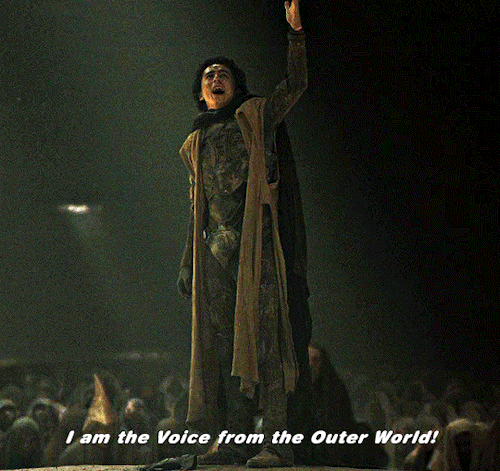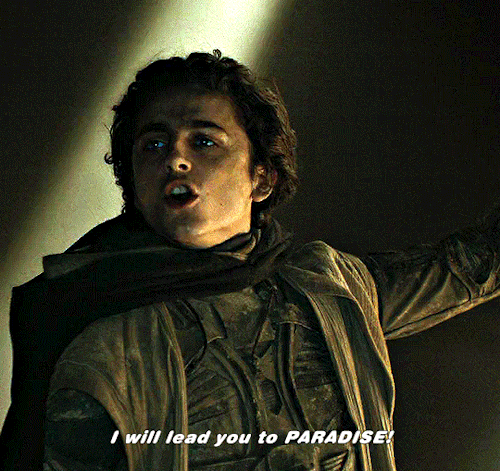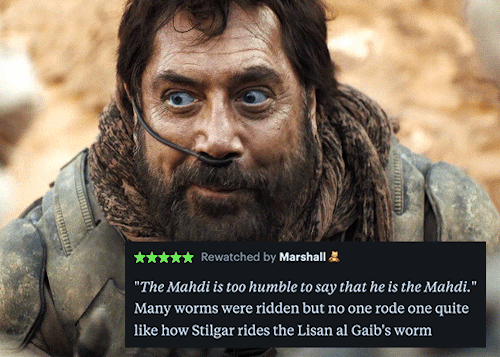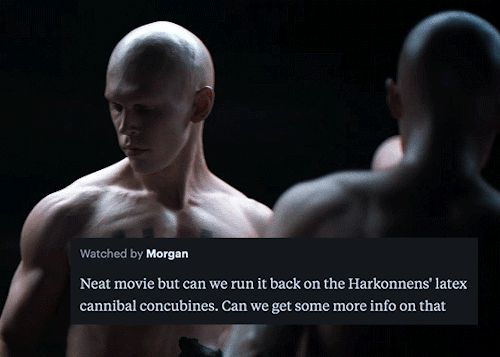Well, I've Finished The Prologue.










Well, I've finished the prologue.
My arm hurts, but it's okay, anyway, it should go away if I don't strain it. After the rest I will continue, so stay with us UwU
More Posts from Bluecinnamonspice and Others
A WIP can sit dormant for a year and a half and still be happy to see you.

some sketches bc i finally watched dune pt.2 !!




Let's make a deal (ft Bill playing with Ford's feelings)




Dune: Part Two (2024) dir. Denis Villeneuve

guess what

you can literally say anything to men, it doesn’t matter
I cannot believe there's absolutely no way to watch free shows and movies anymore, there are too many paid streaming platforms and pirating websites have viruses and ads preventing you from watching it uninterrupted((.)) id rather follow the rules and purchase media moving forward because it is too inconvenient. Seriously, free and no ads or viruses with 1080p streaming is DEAD.







Dune Part 2 + Letterboxd Reviews

logan and laura
decided to post this here while im working on comms!
There are so many places in the Villeneuve Dune adaptations where he just...takes all the narrative pieces that Frank Herbert laid out and subtly rearranges them into something that tells the story better--that creates dramatic tension where you need it, communicates the themes and message of the book more clearly, or corrects something in the text that contradicts or undermines what Herbert said he was trying to say.
The fedaykin are probably my favorite example of this. I just re-read a little part of the book and got smacked in the face with how different they are.
(under the cut for book spoilers and length)
The fedaykin in the book are Paul's personal followers, sort of his personal guard. They show up after his legend has already started growing (the word doesn't appear in the book until chapter 40) and they are people who have specifically dedicated themselves to fighting for him, and right from the moment they're introduced there is a kind of implied fanaticism to their militancy that's a bit uncomfortable to read. They're the most ardent believers in Paul's messianic status and willing to die for him. (They are also, as far as you can tell from the text, all men.)
In the book, as far as I can remember (I could be forgetting some small detail but I don't think so) there is no mention of armed resistance to colonialism on Arrakis before Paul shows up. As far as we know, he created it. ETA: Okay I actually went back and checked on this and while we hear about the Fremen being "a thorn in the side" of the Harkonnens and we know that they are good fighters, we don't see anything other than possibly one bit of industrial sabotage. The book is very clear that the organized military force we see in the second half was armed and trained by Paul. This is exacerbated by the two-year time jump in the book, which means we never see how Paul goes from being a newly deposed ex-colonial overlord running for his life to someone who has his own private militia of people ready to give their lives for him.
The movie completely flips all these dynamics on their head in ways that add up to a radical change in meaning.
The fedaykin in the movie are an already-existing guerrilla resistance movement on Arrakis that formed long before Paul showed up. Literally the first thing we learn about the Fremen, less that two minutes into the first movie, is that they are fighting back against the colonization and exploitation of their home and have been for decades.
The movie fedaykin also start out being the most skeptical of the prophecy about Paul, which is a great choice from both a political and a character standpoint. Of course they're skeptical. If you're part of a small guerrilla force repeatedly going up against a much bigger and stronger imperial army...you have to believe in your own agency. You have to believe that it is possible to win, and that this tiny little chip in the armor of a giant terrifying military machine that you are making right now will make a difference in the end. These are the people who are directly on the front lines of resisting oppression. They are doing it with their own sweat, blood and ingenuity, and they are not about to wait around for some messiah who may never come.
From a character standpoint, this is really the best possible environment you could put Paul Atreides in if you want to keep him humble. He doesn't get any automatic respect handed to him due to title or birthright or religious belief. He has to prove himself--not as any kind of savior but as a good fighter and a reliable member of a collective political project. And he does. This is an environment that really draws out his best qualities. He's a skilled fighter; he's brave (sometimes recklessly so); he's intensely loyal to and protective of people he cares about. He is not too proud to learn from others and work hard in an egalitarian environment where he gets no special treatment or extra glory. The longer he spends with the fedaykin the more his allegiance shifts from Atreides to Fremen, and the more skeptical he himself becomes about the prophecy. This sets up the conflict with Jessica, which comes to a head before she leaves for the south. And his political sincerity--that he genuinely comes to believe that these people deserve liberation from all colonial forces and his only role should be to help where he can--is what makes the tragedy work. Because in the end we know he will betray all these values and become the exact thing he said he didn't want to be.
There's another layer of meaning to all this that I don't know if the filmmakers were even aware of. ETA: rescinding my doubt cause based on some of Villeneuve's other projects I'm pretty sure he could work it out. Given the time period (1960s) and Herbert's propensity for using Arabic or Arabic-inspired words for aspects of Fremen culture, it seems very likely that the made-up word fedaykin was taken from fedayeen, a real Arabic word that was frequently used untranslated in American news media at the time, usually to refer to Palestinian armed resistance groups.
Fedayeen is usually translated into English as fighter, guerrilla, militant or something similar. The translation of fedaykin that Herbert provides in Dune is "death commando"...which is a whole bucket of yikes in my opinion, but it's not entirely absurd if we're assuming that this fake word and the real word fedayeen function in the same way. A more literal translation of fedayeen is "self-sacrificer," as in willing, intentional self-sacrifice for a political cause, up to and including sacrificing your life.
If you apply this logic to Dune, it means that Villeneuve has actually shifted the meaning of this word in-universe, from fighters who are willing to sacrifice themselves for Paul to fighters who are willing to sacrifice themselves for their people. And the fedaykin are no longer a group created for Paul but a group that Paul counts himself as part of, one member among equals. Which is just WILDLY different from what's in the book. And so much better in my opinion.
-
 thesneklordwithwings liked this · 6 days ago
thesneklordwithwings liked this · 6 days ago -
 totallyasexual liked this · 1 week ago
totallyasexual liked this · 1 week ago -
 toastgoatteeth liked this · 3 weeks ago
toastgoatteeth liked this · 3 weeks ago -
 dshysblog liked this · 1 month ago
dshysblog liked this · 1 month ago -
 mysticalpersonapsychicegg liked this · 1 month ago
mysticalpersonapsychicegg liked this · 1 month ago -
 mozsyztar liked this · 1 month ago
mozsyztar liked this · 1 month ago -
 employee-0001 liked this · 1 month ago
employee-0001 liked this · 1 month ago -
 clovercardflonne liked this · 1 month ago
clovercardflonne liked this · 1 month ago -
 auri0318 liked this · 1 month ago
auri0318 liked this · 1 month ago -
 giger liked this · 1 month ago
giger liked this · 1 month ago -
 blehpierrot liked this · 1 month ago
blehpierrot liked this · 1 month ago -
 mr-mcduckface liked this · 2 months ago
mr-mcduckface liked this · 2 months ago -
 thejezhangout liked this · 2 months ago
thejezhangout liked this · 2 months ago -
 daydreamingupandaway liked this · 2 months ago
daydreamingupandaway liked this · 2 months ago -
 moldypoff liked this · 2 months ago
moldypoff liked this · 2 months ago -
 mari4067 liked this · 2 months ago
mari4067 liked this · 2 months ago -
 kallilacherry-blog reblogged this · 2 months ago
kallilacherry-blog reblogged this · 2 months ago -
 kallilacherry-blog liked this · 2 months ago
kallilacherry-blog liked this · 2 months ago -
 nevergoingtobecreative liked this · 2 months ago
nevergoingtobecreative liked this · 2 months ago -
 stolen-glass-bottle liked this · 3 months ago
stolen-glass-bottle liked this · 3 months ago -
 annoyingheartperfection liked this · 3 months ago
annoyingheartperfection liked this · 3 months ago -
 triedsstuff reblogged this · 3 months ago
triedsstuff reblogged this · 3 months ago -
 triedsstuff liked this · 3 months ago
triedsstuff liked this · 3 months ago -
 mossmantha liked this · 3 months ago
mossmantha liked this · 3 months ago -
 martamr2008 liked this · 3 months ago
martamr2008 liked this · 3 months ago -
 wetmeatchaperone liked this · 3 months ago
wetmeatchaperone liked this · 3 months ago -
 altarralomon liked this · 4 months ago
altarralomon liked this · 4 months ago -
 derivative-xd liked this · 4 months ago
derivative-xd liked this · 4 months ago -
 legendarycroissantpandaempath liked this · 4 months ago
legendarycroissantpandaempath liked this · 4 months ago -
 shadowa2022 liked this · 4 months ago
shadowa2022 liked this · 4 months ago -
 spuuks-s liked this · 4 months ago
spuuks-s liked this · 4 months ago -
 moxalotl0 liked this · 4 months ago
moxalotl0 liked this · 4 months ago -
 t-t-tau-me liked this · 4 months ago
t-t-tau-me liked this · 4 months ago -
 diabla-na liked this · 4 months ago
diabla-na liked this · 4 months ago -
 gloriousdeerpeanut liked this · 4 months ago
gloriousdeerpeanut liked this · 4 months ago -
 moviemayhem liked this · 4 months ago
moviemayhem liked this · 4 months ago -
 viridislumineunmei liked this · 4 months ago
viridislumineunmei liked this · 4 months ago -
 valsvonvalentine liked this · 4 months ago
valsvonvalentine liked this · 4 months ago -
 atplayer2133 liked this · 4 months ago
atplayer2133 liked this · 4 months ago -
 pinochin1 liked this · 4 months ago
pinochin1 liked this · 4 months ago -
 nekomancy813 liked this · 4 months ago
nekomancy813 liked this · 4 months ago -
 kaidboommm liked this · 4 months ago
kaidboommm liked this · 4 months ago -
 kurokishohei liked this · 4 months ago
kurokishohei liked this · 4 months ago -
 coolstar104 liked this · 5 months ago
coolstar104 liked this · 5 months ago -
 slightlyvindicatedmst3kfan liked this · 5 months ago
slightlyvindicatedmst3kfan liked this · 5 months ago -
 cinnabonilove liked this · 5 months ago
cinnabonilove liked this · 5 months ago -
 genussanguis liked this · 5 months ago
genussanguis liked this · 5 months ago -
 leafyboygoeeeeee liked this · 5 months ago
leafyboygoeeeeee liked this · 5 months ago -
 ace-aro-agender liked this · 5 months ago
ace-aro-agender liked this · 5 months ago -
 khaosblade liked this · 5 months ago
khaosblade liked this · 5 months ago
